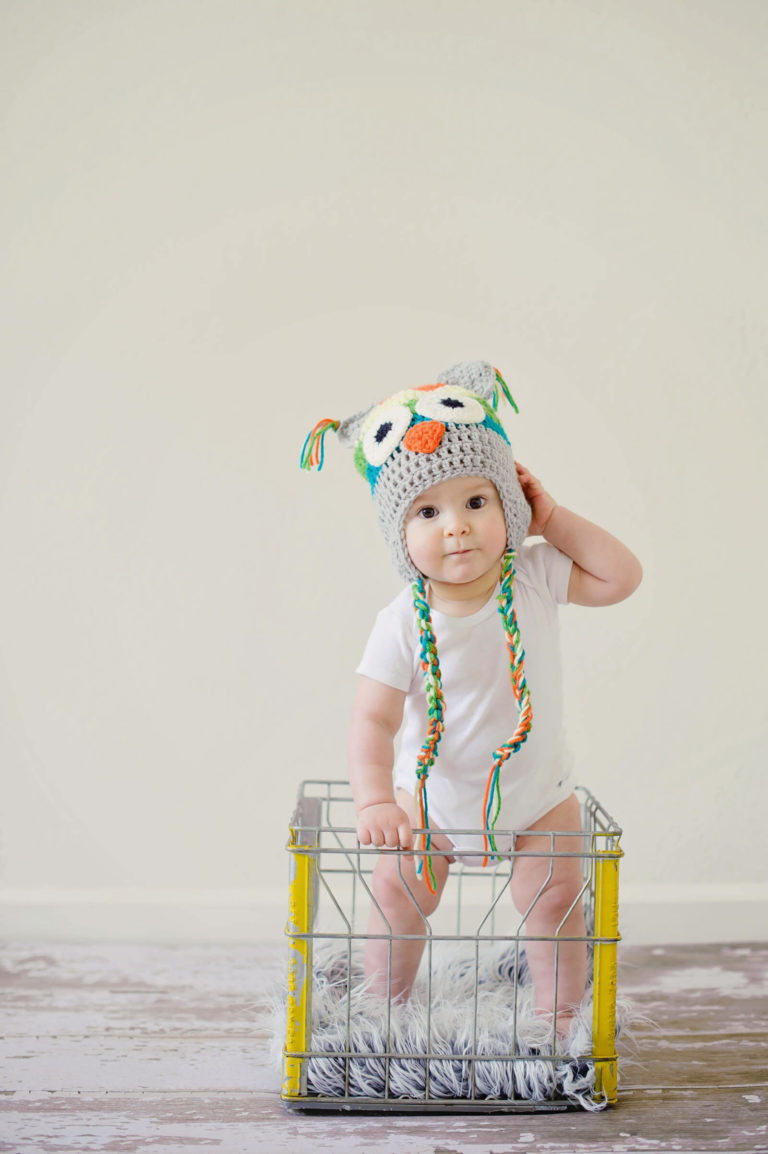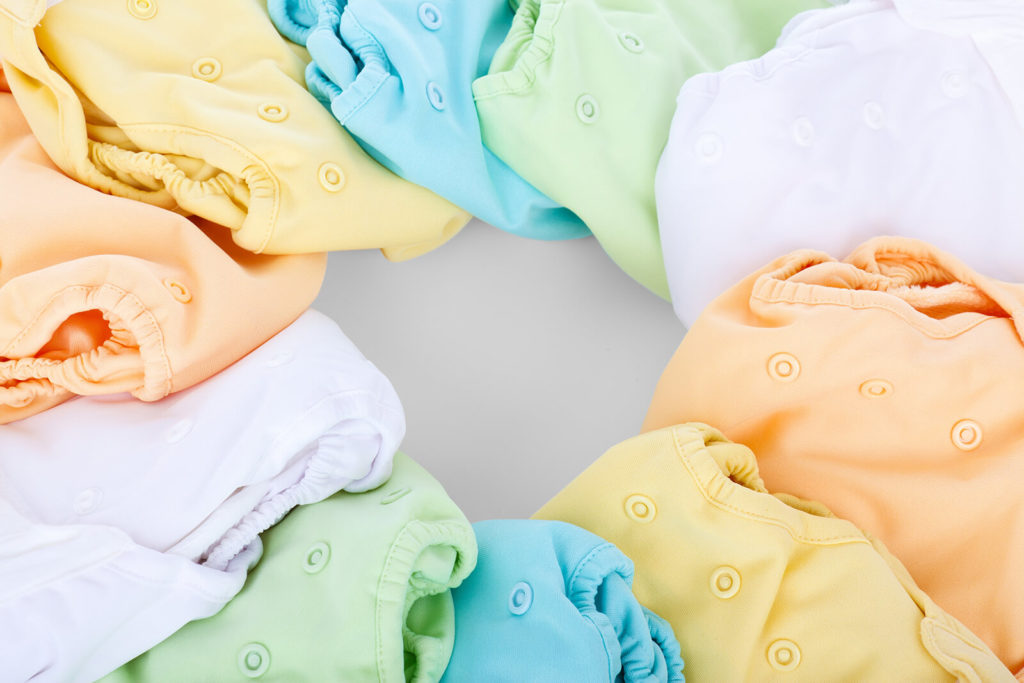In the great diaper debate there are two well known contenders: cloth and disposable. A third less known challenger, the biodegradable disposable, has added a new twist.
Disposable diapers fill up landfills and cloth can be time consuming and messy. The recently introduced organic diapers would solve both those issues, but are they too good to be true? Manufacturers claim organic diapers are made from biodegradable materials. These diapers are said to decompose easily and can be either flushed or composted. The busy, environmentally conscious parents would appreciate convenient options that are not harmful to the planet.
Chlorine Free and Biodegradable Diaper Liners
Organic diapers come in a few varieties. There are chlorine-free diapers which are better for baby and the environment and free of cancer causing toxins. Typical disposable diapers contain harmful toxins such as dioxin and sodium polyacrylate. In Europe, tributylan (TBT) has been found in diapers. TBT is considered one of the most harmful toxins in consumer products.
There are some products made from natural materials that break down easier than conventional diapers, and there are diaper liners which can be flushed or composted. The liners are worn with regular cloth diaper systems, although only the wet liners can be composted, any containing feces have to be flushed.

Organic Disposable Diaper Facts
The makers of these new biodegradable disposable diapers are on the right track, but how much of an environmental impact can they actually make? Disposable diapers, no matter how organic they may be, still end up in landfills. Landfills don’t separate biodegradable waste from the rest, so they end up mixed up with everything else, filling the garbage dumps and not decomposing properly. Landfills are not compost facilities; to properly break down the diapers they need to be taken somewhere that would compost them effectively.
There are facilities that use vermicomposting, which is the consumption of organic materials by earthworms. Vermicomposting can be done at home although some companies don’t recommend it.
Environmental Diaper Choice
Are these diapers worth it? Biodegradable disposable diapers are more expensive than conventional disposables, so if looking to save money, cloth diapers would be a more viable option. For those looking for a fast, environmentally sound option, the new biodegradable diapers may be worth looking into.
By nature, disposable diapers are thrown away. Even using the biodegradable ones, more diapers ending up in the landfills is inevitable. To determine their real environmental impact, how they are manufactured has to be evaluated. Buying from companies making them from recycled or post-consumer materials is best. Looking at how they are made, knowing if they use less water and if they employ more energy efficient methods will help to make a more informed decision.
Even though the manufacturers of this new trend in diapering may not be all they claim to be, they are on the right track to creating environmentally sound disposable diapers. It’s a new option to keep in mind when making the diaper decision.
Best Webshops for Kids Products
Frugi
- Express Delivery Available
- Delivery time: 3-5 days
- Delivery Cost: £ 2.50
- Return period: 60 days
- Free delivery from £60
Olivers Baby Care
- Express Delivery Available
- Delivery time: 2-3 days
- Delivery Cost: £ 3.95
- Return period: 30 days
- Free delivery from £49.99
Mama Bamboo
- Delivery time: 3-5 days
- Delivery Cost: £ 5.95
- Return period: 21 days
- Free delivery from £24
Mamas & Papas
- Express Delivery Available
- Delivery time: 3-5 days
- Delivery Cost: £ 4.95
- Return period: 60 days
- Free delivery from £50
Kite Clothing
- Express Delivery Available
- Delivery time: 3-5 days
- Delivery Cost: £ 3
- Return period: 30 days
- Free delivery from £50
La Coqueta
- Express Delivery Available
- Delivery time: 3-5 days
- Delivery Cost: £ 3.95
- Return period: 14 days
- Free delivery from £150
bebedeparis
- Delivery time: 4-5 days
- Delivery Cost: £ 5.95
- Return period: 30 days
- Free delivery from £100
Mummy And Little Me
- Express Delivery Available
- Delivery time: 2-4 days
- Delivery Cost: £ 2.99
- Return period: 30 days
- Free delivery from £50
https://www.babybjorn.co.uk/
- Delivery time: 3-6 days
- Delivery Cost: £ 7
- Return period: 92 days
- Free delivery from £40
From Babies With Love
- Express Delivery Available
- Delivery time: 2 days
- Delivery Cost: £ 3.95
- Return period: 30 days
- Free delivery from £40
iELM UK
- Express Delivery Available
- Delivery time: 5-7 days
- Delivery Cost: £ 5.4
- Return period: 14 days
- Free delivery from £180
Kids Around UK
- Delivery Cost: £ 5.90
- Return period: 14 days
- Free delivery from £150
BabyMonitorsDirect
- Express Delivery Available
- Delivery time: 2-3 days
- Delivery Cost: £ 3.95
- Return period: 30 days
- Free delivery from £49.99
Samuel Johnston
- Delivery time: 3-7 days
- Return period: 14 days
- Free delivery from £50
Boori
- Delivery time: 12-18 days
- Return period: 14 days
- Free delivery !
Baby Security
- Express Delivery Available
- Delivery time: 1-2 days
- Delivery Cost: £ 3.95
- Return period: 30 days
- Free delivery from £49.99
Tilly And Jasper
- Express Delivery Available
- Delivery time: 2-4 days
- Delivery Cost: £ 1.50
- Return period: 30 days
- Free delivery from £10
PatPat UK
- Express Delivery Available
- Delivery time: 5-7 days
- Delivery Cost: £ 7.64
- Return period: 30 days
- Free delivery from £25.98
Toby Tiger
- Delivery time: 2-5 days
- Delivery Cost: £ 3.99
- Return period: 28 days
- Free delivery from £50
Polarn O Pyret
- Delivery time: 3-5 days
- Delivery Cost: £ 3.95
- Return period: 60 days
- Free delivery from £40
Freerider Co
- Express Delivery Available
- Delivery time: 2-4 days
- Delivery Cost: £ 3.95
- Return period: 30 days
- Free delivery from £100
Bugaboo UK
- Delivery time: 2-3 days
- Return period: 90 days
- Free delivery !
My 1st Years
- Express Delivery Available
- Delivery time: 3.95 days
- Delivery Cost: £ 4
Bluebell
- Express Delivery Available
- Delivery time: 3-5 days
- Delivery Cost: £ 6
- Return period: 7 days
Uber Kids
- Express Delivery Available
- Delivery time: 2-3 days
- Delivery Cost: £ 0.59
- Return period: 365 days
- Free delivery from £49.99
Smallable
- Delivery time: 1-5 days
- Delivery Cost: £ 6.50
- Return period: 7 days
Style My Kid
- Delivery time: 3-5 days
- Return period: 14 days
- Free delivery from £20
Kids Cavern
- Delivery time: 3-5 days
- Delivery Cost: £ 4
- Return period: 21 days
- Free delivery from £100
Vertbaudet
- Delivery time: 5 days
- Delivery Cost: £ 3.99
- Return period: 30 days
- Free delivery from £49
Angelcare UK
- Express Delivery Available
- Delivery time: 3-5 days
- Delivery Cost: £ 3.95
- Return period: 30 days
- Free delivery from £40

